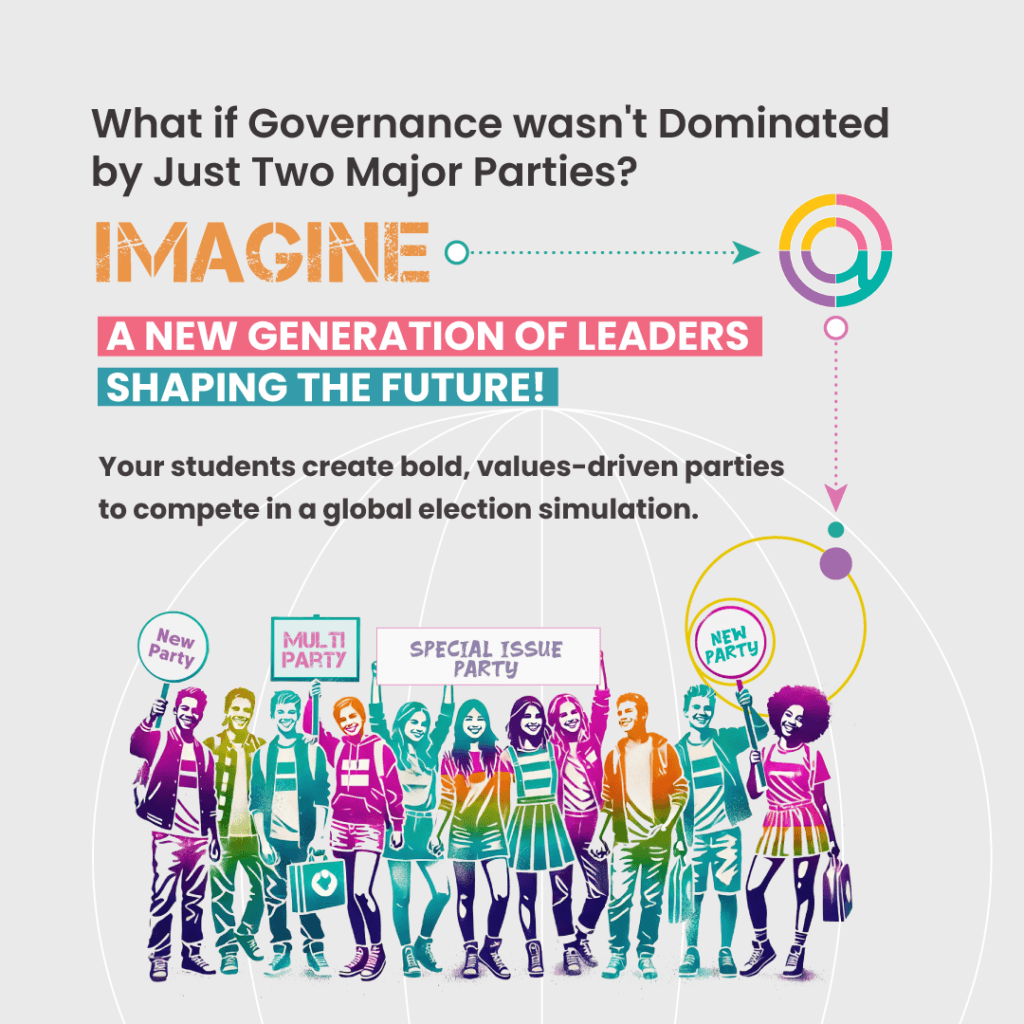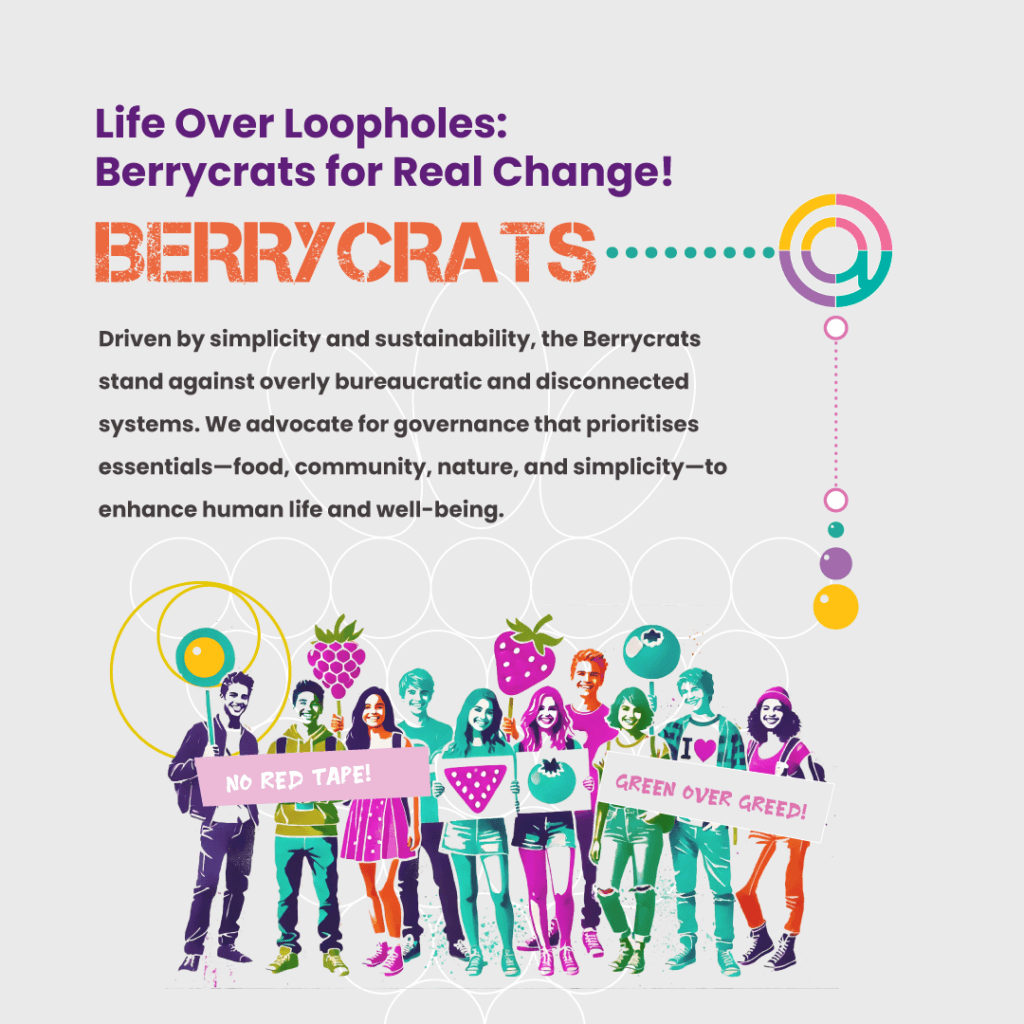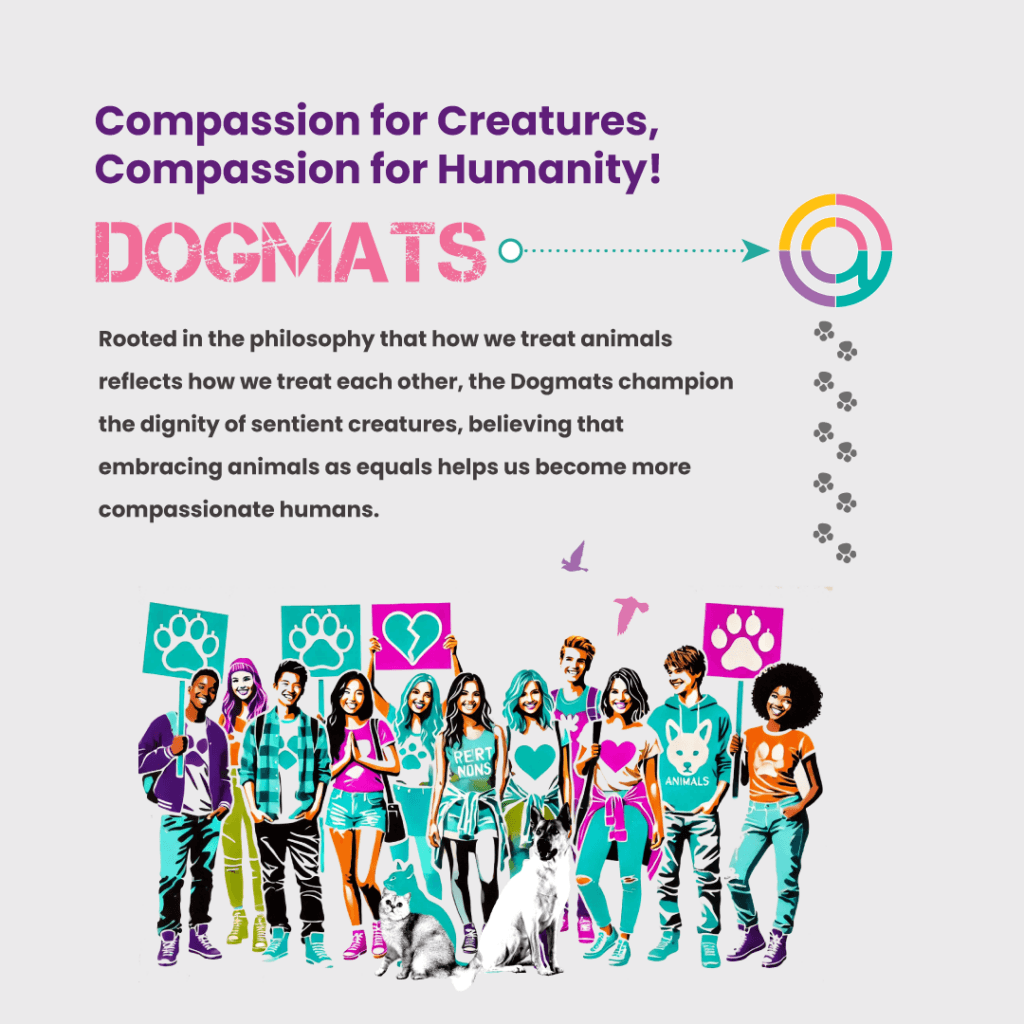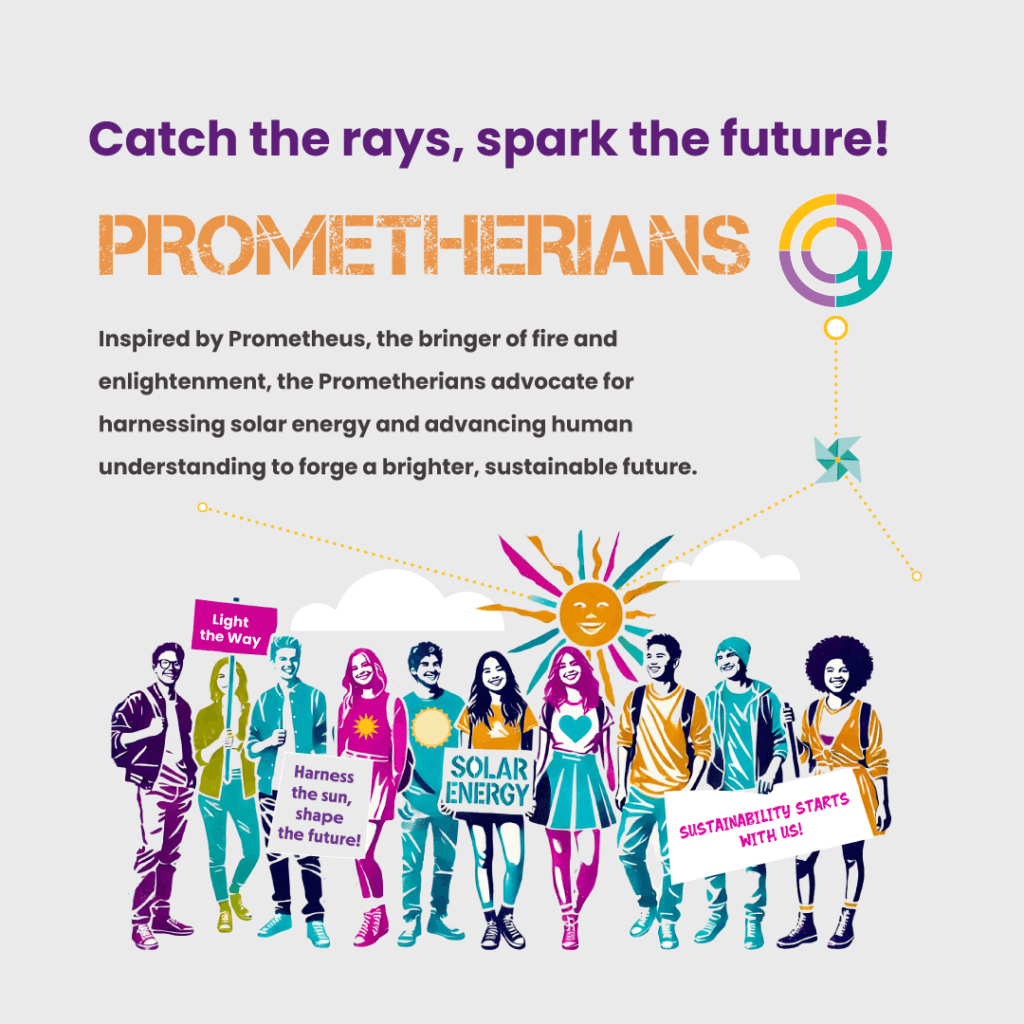Crafting Political Campaign
Venture Overview
In this R@W Venture, students are challenged to create their own political campaigns, designing platforms rooted in unique worldviews. Through this experience, students will not only learn the basics of political communication but also embrace a smart, quirky, and satirical approach to campaigning. Satire is more than fun; it’s a powerful tool for expressing ideas, questioning norms, and sparking conversation. By infusing their campaigns with wit and creativity, students learn how to engage audiences, inspire dialogue, and critique complex issues with a fresh, insightful perspective.
This venture is an interdisciplinary, multimodal exploration that goes beyond traditional learning. Students will gain knowledge across politics, media, economics, and environmental studies, all while honing skills that will serve them well in their futures—empathy, leadership, resilience, and the ability to see the world from unique angles. This blend of intellectual challenge, personal growth, and satirical expression makes the experience both impactful and inspiring.

Fields of Exploration
Political Science – Understanding political systems, ideologies, and policymaking processes while integrating AI-driven simulations and predictive tools to model electoral outcomes and policy impacts. This approach fosters strategic thinking and decision-making in dynamic political contexts.
History & Philosophy – Gaining historical context on political movements and exploring the ethical foundations of governance. Incorporating AI for archival research, textual analysis of historical documents, and exploring philosophical dilemmas through interactive AI-based ethical simulations.
Media & Communication Studies – Exploring the synergy between human creativity and AI technology to develop innovative campaign strategies, analyze media influence, and engage responsibly with digital platforms. This includes leveraging AI to predict trends, craft personalized messaging, and ensure ethical use of social media.
Sociology & Psychology – Analysing group dynamics, public opinion, and the impact of ideologies on society. Using AI to examine large-scale social trends, conduct sentiment analysis, and simulate psychological responses to campaign messaging in diverse demographic groups.
Art & Design – Harnessing AI tools for multidimensional creative processes that produce campaign materials which are not only visually compelling but also deeply meaningful and persuasive. From designing logos and posters to generating videos, animations, and immersive digital experiences, students enhance their natural creative talents, with AI adding a layer of sophistication and scalability to their creative endeavours.
Ethics & Civic Responsibility – Fostering an understanding of responsible leadership, public duty, and personal accountability. Incorporating AI to explore ethical dilemmas in political campaigns, such as data privacy, misinformation, and algorithmic bias, empowering students to advocate for ethical AI use in civic contexts.
Computer Science & Data Analysis – Applying cutting-edge AI and data science methods to extract insights from public feedback, analyse polling data, and evaluate campaign performance in real time. These tools enable precise targeting, adaptive strategies, and data-driven storytelling to amplify campaign impact.
General Skills for Individual Growth
Issue Analysis: Students learn to critically analyse complex social and political issues, approaching each with curiosity, skepticism, and a drive to understand.
Strategic Decision-Making: Crafting policies and deciding campaign strategies encourages students to think ahead, anticipate challenges, and adapt their approach.
Team Dynamics and Leadership: Working in groups of ten or more to build a political party requires delegating tasks, supporting one another, and listening to diverse viewpoints.
Role Identification and Flexibility: Students take on specific roles (like Campaign Manager, Policy Director, Media Strategist), playing to their strengths and adapting as needed.
Confidence in Public Discourse: Through debates and speeches, students gain confidence in presenting their ideas and defending their platform in front of peers.
Persuasion and Diplomacy: Engaging with followers and persuading other teams helps students practice empathy, active listening, and persuasive communication.
Ideation: Crafting a unique party platform encourages students to think outside the box, especially when creating imaginative, unconventional policies.
Adaptability: In responding to other teams, RippleVerse interactions, and feedback, students learn to adapt and refine their strategies.
Handling Success and Failure: Competing in a simulated election builds resilience, helping students see that success and setbacks are both part of the learning process.
Personal Growth: This experience fosters a sense of accomplishment, bolstering confidence as students see their ideas come to life and resonate with others.
Respect for Diverse Viewpoints: Engaging with other parties and learning about different ideologies encourages empathy and an appreciation for diversity of thought.
Responsibility and Integrity: Ethical campaigning helps students recognise the importance of truth, integrity, and respect in leadership roles.
R@W Life-Long Knowledge Generation Skills
Application of the Learning Ripple (Push & Pull) and Innate Feedback Loops (Catching & Being Caught): These skills invite curiosity, giving students an innovative approach to feedback and learning that goes beyond traditional feedback methods.
Teaming on the Fly: Students learn to form teams dynamically and spontaneously, harnessing the startup principle of ‘Ad-Hoc Teaming.’ They practice gathering knowledge from diverse sources in real time – Being in the World – and collaboratively evaluating this data in the Detectives’ Studio. This skill set prepares them for the ever-evolving, fast-paced environments of both education and the professional world.
Social Media Skills: Students learn to see and use social media as a powerful tool for generating new knowledge.
Participatory Creativity: Develop the ability to initiate social media activities that benefit one’s own creative process.
Validated Learning: A startup principle of taking action, evaluating results, readjusting, and then deciding whether to ‘proceed or pivot.’
Individual Agency: Encourages students to actively discover unique beneficial individual characteristics and develop a repertoire of knowledge and skills for real-life application.
Metacognitive Skills – Diffraction offers a multi-angled approach to self-reflection, helping students recognise how their thinking and behaviour influence others—and how they are, in turn, influenced by others’ thoughts and behaviours.
Cinematic Writing: Students narrate their self-reflection using images, audio, animations, and video—creating a personal “cinema” of their creative process.
Multimodality: Teaches students to communicate ideas through a combination of images, audio, animations, and video.
Strategic Tinkering: Encourages a developmental approach of unpressured, iterative improvement of an idea, concept, or system.
Bricolage: The ability to resourcefully use diverse elements at hand to solve an immediate problem.
Venture Highlights
Party Ideology: Teams research ‘wacky’ parties created in real life and select a unique, “satirical” or “multi-layered” worldview (e.g., Berrycrats, Dogmats, Prometheans). The party’s philosophical foundation should critique the faults of existing political establishments and offer creative solutions for addressing societal challenges.
For Example:
The Berrycrats: The Berrycrats oppose overly bureaucratic, disconnected systems. They believe governance should prioritise essentials—food, community, nature, and simplicity—over complex, artificial structures.
The Dogmats: Rooted in the philosophy that how we treat animals reflects how we treat each other, the Dogmats champion the dignity of sentient creatures, believing that embracing animals as equals helps us become more compassionate humans.
The Prometheans: Inspired by Prometheus, the bringer of fire and enlightenment, the Prometheans advocate for harnessing solar energy and advancing human understanding to forge a brighter, sustainable future.
Manifesto: Teams develop core beliefs, values, and a mission statement to represent their party.
Policy Platform: Proposals address key issues such as the environment, health, and community welfare.
Campaign Strategy: Teams design tactics to promote their party, attract supporters, and spread their message effectively.
Elections: Mock elections take place on the RippleVerse platform, where teams compete for votes from a wider audience.
Venture Dates
The venture begins February 3, 2025, and ends May 30, 2025.
Duration: 15 weeks.
Venture Setting
The PowerPlay Venture unfolds within the PowerPlay Venture Hub on the R@W website and the RippleVerse community network platform.
Preparing to Guide the Venture
Becoming a guide for any venture in the RippleVerse, including the PowerPlay Venture, requires participation in a specialised teacher training program. This program introduces an innovative pedagogical approach that equips educators with advanced strategies and techniques to enhance classroom engagement and student outcomes. By applying these methods to everyday teaching, guides gain valuable tools to foster meaningful and impactful learning experiences.
This training is essential for RippleVerse ventures because it ensures that guides are well-prepared to facilitate structured, engaging, and conflict-free competitions. It provides the foundation for a smooth and rewarding experience for both guides and students.
Training Details:
Four self-paced modules hosted on the Canva platform.
Each module includes:
• A series of short videos totalling 30–40 minutes.
• A practical task requiring approximately 1.5 hours.
Total time commitment: Approximately 6 hours across all modules.
Certification: Upon completion, participants receive a R@W Pedagogy Certificate, which is required to guide ventures.
You can learn more about the training by visiting the R@W Teachers’ Hub:
R@W_Pedagogy_Seminar
Team Organisation
The Guide: The guide could be a teacher, student-teacher, tutor, program leader, or even a parent acting as the venture’s facilitator.
The guide also becomes an administrator for the PowerPlay Venture Hub, collaborating with other guides of competing teams.
Team Formation: The guide organises a venture team (maximum of 10 students per team) by inviting students to join.
At the initial stage, team names are placeholders (e.g., Team 1, Team 2) until the team decides on their party’s name.
Roles and Individual Positions in the Team
In R@W ventures, team members are referred to as venturers to distinguish them from the broader RippleVerse community participants.
The following roles are suggestions to guide team organisation. Teams can choose to use them as described or modify them to better suit their needs and strengths:
Administrator-Coordinator: Oversees team communication, progress tracking, and overall coordination.
Policy Director: Leads the development of the party’s manifesto and policy platform.
Communications Strategist: Plans the campaign’s messaging and outreach strategies.
Statistics Analyst: Gathers and interprets data to support campaign strategies.
Grassroots Organiser: Focuses on drawing people to the RippleVerse and building a community around the party’s platform.
Central Topic Researcher: Investigates core topics related to the party’s focus (e.g., ecology, animal welfare) to inform policies.
(Teams can assign two researchers if needed.)
Media Creator: Produces visual and digital content for the campaign (e.g., posters, videos).
(Teams can assign two creators if needed.)
Party Influencer or Spokesperson, or Reporter: Shares this role with another team member, acting as vloggers or social media reporters who post weekly updates on the PowerPlay Venture Hub feed.
Web Developer: Designs and maintains the digital presence of the campaign, such as a party webpage or RippleVerse posts.
How Progress and Votes Work
R@W ventures focus on evaluating the process rather than just the final outcome, reflecting the widely expressed contemporary concept of ‘continuous becoming.’
What is assessed in R@W ventures includes:
• Observance and resourcefulness in identifying problems.
• Collaboration within the team and with the outside community.
• Communication of ideas and responses to feedback.
• Creativity and innovation in solving problems.
• Critical evaluation of progressive steps that earn likes from the RippleVerse audience.
The Role of 🔄 (Feedback) and 👍-s (Likes)
Teams use audience 

Continuous reporting on the Venture Hub feed allows venturers to:
• Evaluate and improve their strategies.
• Generate public affection and build a following of supporters.
While 👍-s and comments measure engagement during the venture, the ultimate goal is to win the election simulation at the end. This final phase shifts from generating 👍-s to earning 🗳️(votes)—a true test of the team’s ability to connect with their audience and inspire loyalty.
The Influencer Role
Among the team roles, R@W ventures suggest having an influencer—a spokesperson, reporter, vlogger, or another title the team creates.
- The style of presentations depends on the creativity of the team.
- The influencer/vlogger can present individually or alongside other venturers.
- Presentations must showcase the unique involvement and special talents of every venturer, ensuring the audience sees the collective effort behind the team’s success.
- Multimodal reporting is encouraged, using videos, graphics, photos, interviews, animations, and more.
Why the Influencer Role Matters
This role is essential for:
- Attracting
reactions from the audience.
- Testing ideas and gathering 🔄 feedback.
- Building a strong following in preparation for the final election simulation.
While the vlogger leads the reporting, it is a collaborative team effort, reflecting the depth, wit, and enthusiasm of every venturer’s involvement.
• Each venturer plays a unique role in producing outcomes, showcasing their individual talents in meaningful ways.
Collaboration with AI
- In R@W ventures, AI is not seen as a replacement for human creativity but as a tool to enhance the collaborative process and drive innovation.
Guidelines for AI Collaboration
- The role of AI should be transparent, ensuring it is an openly acknowledged partner in the creative journey.
- AI should not be used as a shortcut or hidden behind, where its contributions are misrepresented as purely human effort.
- Instead, collaboration with AI should highlight the unique strengths of both, showcasing how working together leads to better, more innovative outcomes.
Venture Timeline
Week 1 (Feb 3–9) – Venture Launch
Venturers are introduced by vloggers to the RippleVerse public, presenting their initial ideas on why there’s a need to create a party.
Week 2 (Feb 10–16) – Data Generation
Vloggers report exciting discoveries from venturers’ local political research, highlighting key issues, challenges, and moments of inspiration.
Week 3 (Feb 17–23) – Party Ideology
Venturers explore real-life ‘wacky’ parties, absurd policies, and satirical approaches. They identify political absurdities in their local community to inform their party’s core mission.
Week 4 (Feb 24–Mar 2) – Ideation
Venturers originate their party’s name and core values based on the absurdities they’ve uncovered and their chosen ideology.
Examples:
Berrycrats: Oppose overly bureaucratic systems, championing essentials like food, community, nature, and simplicity.
Dogmats: Advocate for animal dignity and the belief that embracing animals as equals fosters human compassion.
Prometheans: Promote solar energy and human enlightenment, drawing inspiration from Prometheus, the bringer of fire.
Week 5 (Mar 3–9) – Leadership and Satire
Teams decide whether they need a party leader at all. They brainstorm how to weave satire techniques—exaggeration, irony, parody, juxtaposition, and absurdity—into their campaigns to highlight real-world issues. They begin drafting their manifesto.
Week 6 (Mar 10–16) – Absurd Policy Experimentation
Venturers develop and present absurd policies to the community.
Examples:
Berrycrats: Nationalise candy factories, replacing them with berry farms for public health.
Dogmats: Ban animal shelters—send all animals straight to loving homes.
Prometherians: Turn the Moon into a giant solar panel to solve Earth’s energy crisis.
Venturers also begin to create a strong visual identity with logos, slogans, and symbols
and a website.
Week 7 (Mar 17–23) – Implementation
Venturers announce their draft absurd policy on the RippleVerse community feed, generating feedback.
Week 8 (Mar 24–30) – Proceed or Pivot?
Venturers reflect on the community’s reaction to their absurd policy.
Was it divisive? Supported? Thought-provoking?
Could elements of the policy be reworked into a more refined concept?
Week 9 (Mar 31–Apr 6) – Manifesto
Venturers refine their party position, developing core beliefs, values, and a mission statement to finalise their manifesto.
Week 10 (Apr 7–13) – Policy Platform
Teams propose key policies addressing issues such as the environment, health, and community welfare, guided by their party’s ideology.
Easter Holiday (Apr 14–27)
Week 11 (Apr 28–May 4) – Campaign Strategy
Venturers design tactics to promote their policies, attract supporters, and spread their message. Strategies may include satire, emotional appeals, storytelling, branding, data presentation, and interactive social media engagement.
Weeks 12–13 (May 5–18) – Creating the Campaign
Teams bring their campaigns to life by:
Sharing testimonials and personal stories.
Highlighting their team’s journey and challenges.
Using stats and infographics to bolster credibility.
Engaging followers with hashtags, challenges, and video content.
Week 14 (May 19–25) – Election Day (May 20, 2025)
Venturers gather votes, celebrate victories, and reflect on their campaigns.
Week 15 (May 26–Jun 1) – Reflection and Vision
Teams present video reflections on their journey, answering:
• Could a multiparty political system create a more collaborative and harmonious society?
• How might your party contribute to such a vision?
• What have you learned about the challenges and possibilities of multiparty governance?




Interested?
